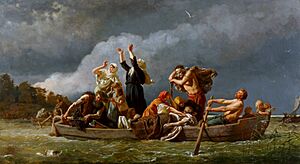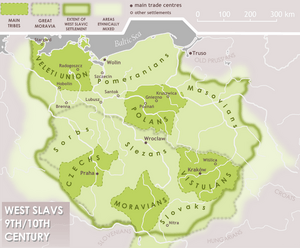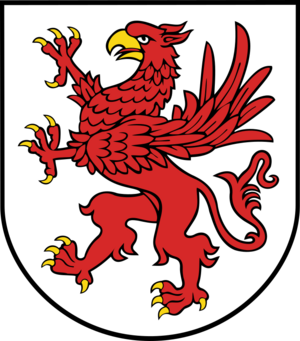Pomeranians (tribe) facts for kids

The Pomeranians were a group of West Slavic people. They are first mentioned in history around the 10th century. From the 5th to the 6th centuries, they settled along the coast of the Baltic Sea. This area was between the mouths of the Oder and Vistula Rivers. Today, this region is known as Farther Pomerania and Pomerelia.
The Pomeranians spoke a language called Pomeranian language. This language was part of the Lechitic languages group. The name Pomerania comes from an Old Polish phrase, po more. This means "Land at the Sea," which makes sense because they lived by the Baltic Sea.
Contents
Early History of the Pomeranians
After earlier groups of hunters left the area, different people lived there. These included Celts and groups related to the Germanic tribes like the Goths. Around the 6th century, Slavic groups moved into the region. This led to the formation of the Pomeranian tribes. There was also a specific Pomeranian culture that existed before them.
From about the 6th century, West Slavic tribes traveled along the Vistula and Oder Rivers. They settled in the southern Baltic region. This area was already home to large settlements of Vikings and Danes. There were also important trading centers. Examples include Jomsburg near the Oder River mouth and Danzig near the Vistula River mouth. An old record from the 12th century, the Nestor Chronicle, says that Pomeranians came from the same tribe as Poles and other Slavic groups.
Pomeranians from 900 to 1200
By the year 967, Duke Mieszko I of Poland took control of the lands between the Vistula and Oder Rivers. He won a big battle against the Wolinians. The first time the name "Pomorie" was written down was in 997. It referred to the ruler of this area.
The Piast dukes of Poland tried to make the Pomeranians part of their kingdom. They were successful at first. However, in 1005, Polish Duke Bolesław I the Brave lost control of the area. A document from 1064 mentions a leader named Zemuzil Bomerianorum. He is the first known Pomeranian duke.
During the 12th century, the Pomeranians were not Christian. They faced many attacks from their Christian neighbors. These neighbors included Denmark, Poland, and the Saxon dukes from the Holy Roman Empire. In 1121, Polish Duke Bolesław III Wrymouth finally defeated them. He set up a church center in Kołobrzeg. Reinbern became the first bishop there. The Pomeranians became Christian with help from a German missionary named Otto of Bamberg.
Around the same time, a Pomeranian Prince named Wartislaw I took over lands west of the Oder River. Later, his family, the House of Griffins, lost a battle to the Saxons in 1164. After this, they agreed to be under the rule of Duke Henry the Lion. The Pomeranian lands were then split up. The western part became the Duchy of Pomerania in 1181 and joined the Holy Roman Empire. The eastern part, Pomerelia, was influenced by Poland. Later, in 1309, it came under the control of the Teutonic Order.
Changes in Culture
Over time, many settlers from the Holy Roman Empire moved into Pomerania. This movement is known as the Ostsiedlung. These new settlers caused the Germanization of Pomerania. This means that many native Pomeranians slowly started to adopt German language and culture. They gradually stopped using their Slavic language and traditions.
Modern Descendants
Today, the direct descendants of the Pomeranians include several groups:
- Kashubians: They speak the Kashubian language.
- Slovincians
- Kociewiacy
- Borowiacy
- Western Pomeranians: They speak Low German or Standard German.
- Eastern Pomeranians: Many of them were forced to leave Pomerania in 1945. They settled in different parts of Germany and now speak German.
See also
- Conversion of Pomerania
- Kashubian-Pomeranian Association
- Pomeranian culture
- Polish tribes
- Early history of Pomerania
- List of Medieval Slavic tribes



